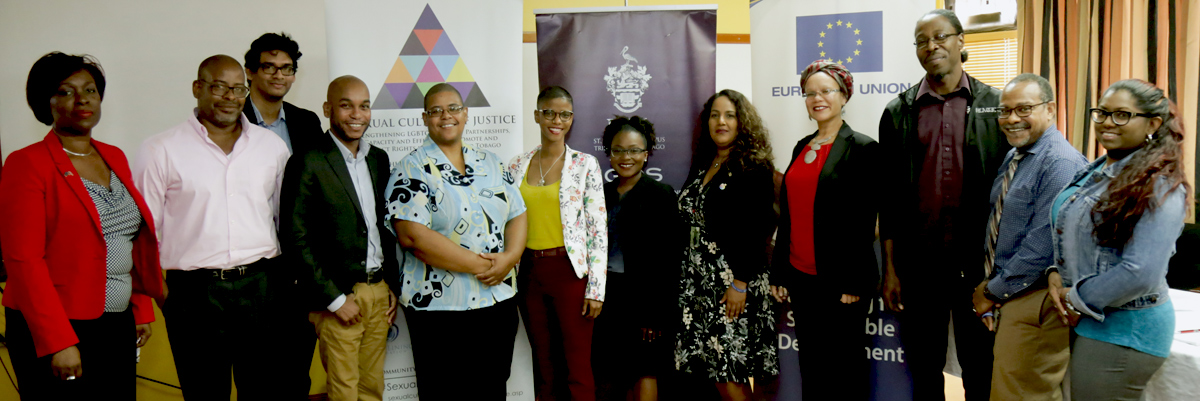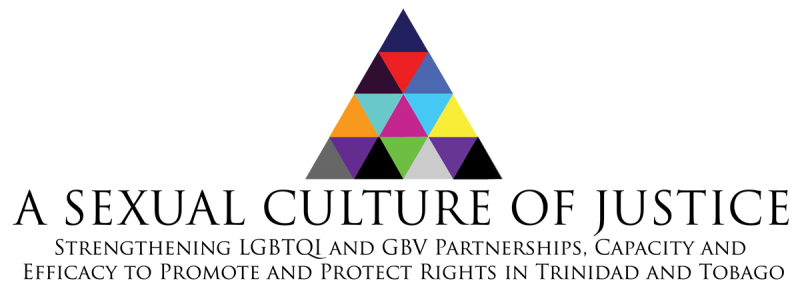A Sexual Culture of Justice

Community-University Collaboration | Led by The UWI, Institute for Gender and Development Studies
Project Lead Researcher: IGDS Lecturer, Dr. Angelique Nixon
Successful Award for
“Respect for fundamental human rights and freedoms in Trinidad and Tobago”
Human Rights Grant, European Commission, Trinidad and Tobago Delegation
A Sexual Culture of Justice: Strengthening LGBTQI & GBV Partnerships, Capacity & Efficacy to Promote & Protect Rights in T&T is a human rights project funded by the European Union and implemented by the University of the West Indies, Institute for Gender and Development Studies (IGDS), in collaboration with six LGBTI and feminist organisations in Trinidad and Tobago: CAISO, Friends for Life, I Am One, The Silver Lining Foundation, Womantra and The Women’s Caucus.This project is a new community-university collaboration that provides three years of support for some of the longest-standing and emerging local efforts to transform approaches to partner violence, homophobia, bullying and policing, while building partnerships and organisational capacity.
Online E-Portal
Project Outputs
The project’s impact can be seen through the following completed activities and outputs:
1 Creation of new accessible knowledge products (toolkits, research, and media) that strengthen local advocacy grounded in Caribbean theories, praxis, evidence, and analysis through the Online Knowledge E-Portal, which features outputs of the project: portal.caribbeansexualties.org.
2 Completed GBV Training for a diverse group of 15 men to champion a new culture of gender equality and non-violence in their different communities, which facilitated media creation of scripted messages and the #PullUpYuhBredren Campaign through Five Video PSAs – Men Speak Up! Champions Against GBV – shared widely across social media with thousands of views.
3 Four Community Actions (led by men who participated in or facilitated the GBV training) utilised the #PullUpYuhBredren campaign and a peer to peer training pedagogy. Each action included 10-20 persons and therefore the actions’ impact extends to over 50 persons.
4 Trained 46 teachers and guidance counsellors in two cycles of teacher training workshops; Developed the “Safer Schools Teacher Training” toolkit and facilitator guide focused on preventing the culture of bullying of young people related to sex and gender.
5 Provided support for over 10 families and guardians of LGBTQI youth and 10 LGBTQI persons through Stronger Families group and individual therapy.
6 Collected 18 Lifestories of working-class LGBTIQ people that offer reflections on experiences with family, support systems and violence, as well as a needs assessment and ideas for social change and transformation. These Lifestories are the first research of its kind and will directly impact the project’s output of policy development and recommendations towards legislative action.
7 Ongoing Campaign for legal protection for LGBTI persons from unjust discrimination through the ongoing “Add All Three to the EOA” – a public awareness and legislative campaign to expand protections in the Equal Opportunity Act on the basis of Age, Health Conditions, and LGBTI Status. The campaign includes four radio ads, first wave released on four stations, two waves to follow on other stations, an animation video launched across social media, and a policy agenda in progress.
8 Completed a National Survey of Bullying and Gender Based Violence of 40 secondary schools (38 in Trinidad and 2 in Tobago) with an average of 60 students per school that followed the two cycles of teacher training workshops. The total of secondary students surveyed is over 2,400 students. Data analysis and report in progress.
9 Organised and Facilitated “Transforming Each Other’s Advocacy” Course with 22 participants and 7 facilitators representing 18 organisations/coalitions from a wide spectrum of civil society working on human rights, social justice, governance and development. This was a 6-month action learning course held from October 2019 to March 2020 in collaboration with two other European Union funded projects (Veni Awpan - CSOs for Good Governance; Cropper Foundation - CSOs for Good Environmental Governance), as well as UNAIDS Caribbean and the Lloyd Best Institute. The course included five day-long sessions (with specialized workshops on Governance & Mobilisation, and Communication & Advocacy Capacity Building), as well as mentorship coaching and collaborative decision-making on funding and support for action campaigns. The Five Action Campaigns chosen by the participants and facilitators are ongoing and include: “Healthcare Training Workshop on Sex & Gender Diversity”; “Human Rights meet Climate Action”; “Support Groups for Advocates”; “Extractive Industries Media Campaign”; “Schools of Participation on Social Violence”. Some of these actions have had to be postponed due to the COVID-19 lockdown but expected to continue with needed changes.
Testimonials from Formal Partners
“A Sexual Culture of Justice represents a local landmark in collaboration between the academy and civil society. Many of the project’s elements offer a model for how tertiary institutions can respect the value and the leadership of grassroots civil society groups in creating solutions to challenging policy issues, and how institutional structures can use their capacity to expand the impact and influence of grassroots community groups and leaders. It enacts principles IGDS has long espoused about the role of the university in the world. What is also unique about it for me is that we are learning lessons both from areas in which we have succeeded and those in which we have not. It has been one of CAISO’s most productive partnerships.”
– Colin Robinson, Director of Imagination
CAISO: Sex & Gender Justice
“Working together with The UWI IGDS and the organizations of the Alliance for Justice and Diversity on the ‘Sexual Culture of Justice’ project over the past two years has offered WOMANTRA the opportunity to work in a supportive environment with other activists that share common goals and mobilize the wider queer community around issues that centre our experiences. We appreciated the flexibility the project provided to engage unexpected political moments, including the Jason Jones case and the first Pride Parade in our country’s history. Our organization also benefited from deepened relationships with the Trinidad and Tobago Police Service through the project and partnerships, which is a critical first-step in achieving the long term institutional change we hope can be felt both within and outside of our community beyond the life of this project.”
– Stephanie Leitch, Founder and Co-Director
WOMANTRA
The Silver Lining Foundation (SLF) is pleased to have partnered with the Institute of Gender and Development Studies (IGDS), The UWI, for the Sexual Culture of Justice project. Our partnership with the IGDS has given us greater access to technical resources and knowledge to augment many aspects of the delivery of our work. The bridge built between academia and community activism ensures that the scholarship produced within the UWI helps guide community outreach and interventions by strengthening civil society capacity so that we may discharge or duties to the publics we serve- teachers, students and their parents. We hope that the sustainability of the partnership continues given our shared priorities and goals and that we can continue to count on the support of IGDS and The UWI in the transformation of the education system in Trinidad and Tobago and across the Caribbean.
– Jeremy Steffan Edwards, Executive Director
The Silver Lining Foundation
Testimonials from Participants
on the impact of the course
“Transforming Each Other’s Advocacy”
“It has been, quite frankly I think, the most important period of my career as an advocate. I learned so much from the other groups and advocates who were involved. Not just about how other types of advocacy can work, and the challenges of other types of advocacy but I also learned a lot about myself, my strengths, my weaknesses and how best to channel my energy in the most productive and effective way as an advocate and how best to support others in civil society in their own advocacy work.”
“Not very often do I get to sit in a room with various stakeholders from a wide range of organizations. It really was an eye-opener for me in terms of the work that those other organizations do and the challenges that they face and how similar those are to the challenges that I face in my organization.”
“I can say that it was inspiring and encouraging and the people involved gave me a new sense of hope because there were so many young people who are very passionate.”
“The [course’s] advocacy support group been phenomenal because it has helped to validate our experiences as leaders in the sector and to address some of the issues that we have that nobody else ever asks about. So like even now, in this time of [COVID] crisis, we're reaching out to each other to support each other through whatever we're going through.”
“This course and the workshops sensitized me and alerted me to the different avenues that we can use to open the gate for more effective advocacy.”
“From an organizational point of view, it's put me in contact with persons who have been doing advocacy for a much longer period of time which means that I can gain information from their wisdom, from things that they have done before. It's just given me mentors that I can look up to, to help with the growth of my own NGO.”
















